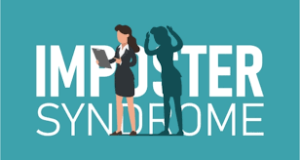Success, by definition, means different things to different folks. Most writers probably see “success” as being published—repeatedly. They work hard, take risks, and accept that being exposed to failure is part of success. They’re confident souls and keep-on-writing regardless of what others think. Then, there are those who outwardly “make it” but, deep inside, see themselves as imposters.
Yesterday morning, I was reading an online article at Global News which is one of Canada’s leading media sites. The piece was occasionally interrupted with paid ads by prominent players like Ford, Ikea, Microsoft, Audible, and Formica who financially support Global so they can survive in the commercial news biz. All of a sudden I went, “Whoa! Am I really seeing this?”
 Before my eyes was an advertisement from Rakuten Kobo, and there was the cover of my newest publication. Kobo chose my book Between The Bikers as their featured promotion and exposed it before I don’t know how many critical eyes. And this Global ad was bought and paid for by Kobo—not me. I knew nothing about the promo before stumbling upon it.
Before my eyes was an advertisement from Rakuten Kobo, and there was the cover of my newest publication. Kobo chose my book Between The Bikers as their featured promotion and exposed it before I don’t know how many critical eyes. And this Global ad was bought and paid for by Kobo—not me. I knew nothing about the promo before stumbling upon it.
I said to Rita, “Well, will you look at this…” My wife glanced, smiled, and replied, “You’re quite the success.” I had to agree, but then I immediately thought of an earlier email exchange with a highly successful UK writer friend who told me he suffers from Imposter Syndrome (IS).
Before going into what Imposter Syndrome might be, I had to click on Dictionary.com for two definitions:
Success — noun
- the favorable or prosperous termination of attempts or endeavors; the accomplishment of one’s goals.
- the attainment of wealth, position, honors, or the like.
- a performance or achievement that is marked by success, as by the attainment of honors: The play was an instant success.
- a person or thing that has had success, as measured by attainment of goals, wealth, etc.: She was a great success on the talk show.
Imposter — noun
- a person who practices deception under an assumed character, identity, or name.
This got me thinking, What if I’m just an imposter, a bullshit clown, and this Kobo recognition hasn’t been honestly earned? I know that friends, family, and former police colleagues—as well as fellow writers—are going to see this thing, click on it, and expose me for what I might truly be. Oh, the humiliation…
 I don’t know who, or how many, saw the Kobo ad. I guess upcoming stats will tell if the promo was successful, but the startling experience made me think of my UK friend and what was going on with his IS insecurity. So, I did some Googling and came up with a fascinating article and self-examination on the New York Spirit psychology-therapy site titled What Is Imposter Syndrome? It opens like this:
I don’t know who, or how many, saw the Kobo ad. I guess upcoming stats will tell if the promo was successful, but the startling experience made me think of my UK friend and what was going on with his IS insecurity. So, I did some Googling and came up with a fascinating article and self-examination on the New York Spirit psychology-therapy site titled What Is Imposter Syndrome? It opens like this:
“Welcome to the world of the Imposter Syndrome. It is a secret world, inhabited by successful people from all walks of life who have one thing in common – they believe that they are not really good enough. They might be men or women, young or old. And imposter beliefs are not always related to work; I have met ‘imposters’ who feel they are not good enough parents, husbands, wives, friends or even not good enough human beings. These are all variations of Imposter Syndrome, especially when there is little objective evidence to support the sufferers firmly held self-beliefs that they are frauds.
The term ‘Imposter Syndrome’ or ‘Imposter Phenomenon’, was first coined in 1978 by clinical psychologists Pauline R. Clance and Suzanne A. Imes in a paper entitled ‘The Imposter Phenomenon in High Achieving Women: Dynamics and Therapeutic Intervention’.
The condition was described as being ‘an internal experience of intellectual phonies’ that afflicted some high-achieving women. In their paper, Clance and Imes described their sample group of 150 women as follows, ‘despite their earned degrees, scholastic honors, high achievement on standardized tests, praise and professional recognition from colleagues and respected authorities… [they] do not experience an internal sense of success. They consider themselves to be “impostors”.’ They go on to explain that these women believe they have only achieved their success due to errors in selection processes, or because someone has overestimated their abilities, or that it is due to some other external source.”
Drs. Clance and Imes list three characteristics that define Imposter Syndrome:
- Persistently attributing your success to external factors like luck or others.
- Believing others have an inflated view of your skills, abilities, and talents.
- Fearing you’ll be found out and exposed as a fake.
 The New York Spirit piece notes that Imposter Syndrome isn’t a recognized mental health condition. (I checked with the DSM-5 and it’s not.) However, through Wikipedia I found a book by researcher Valerie Young titled The Secret Thoughts of Successful Women: Why Capable People Suffer From the Impostor Syndrome and How to Thrive in Spite of It. In her book, Ms. Young identified five subgroups this syndrome falls into.
The New York Spirit piece notes that Imposter Syndrome isn’t a recognized mental health condition. (I checked with the DSM-5 and it’s not.) However, through Wikipedia I found a book by researcher Valerie Young titled The Secret Thoughts of Successful Women: Why Capable People Suffer From the Impostor Syndrome and How to Thrive in Spite of It. In her book, Ms. Young identified five subgroups this syndrome falls into.
- The perfectionist
- The superwoman/man
- The natural genius
- The soloist
- The expert
Ms. Young states more than 70% of people experience impostor syndrome at some point in their career. That’s regardless if they’re a rocket surgeon, brain scientist, or crime/thriller/mystery writer.
Back to the New York Spirit article. I love quizzes and was most interested in taking their short self-assessment to see whether or not I had Imposter Syndrome. This is how NY Spirit described it: This quiz is based on the common symptoms outlined above and is not meant to be a diagnostic mental health tool, but rather a quick and simple way to ascertain to what degree you feel like you are an imposter. It goes like this…
How easy do you find it to accept praise?
Very hard — 1 Quite hard — 2 Quite easy — 3 Very easy — 4
When you do something well, how likely are you to dismiss it as not really much (eg it was easy, anyone could have done that, it was nothing special).
Very likely — 1 Quite likely — 2 Not very likely — 3 Not at all likely — 4
When you do something well, how likely are you to attribute your success to luck?
Very likely — 1 Quite likely — 2 Not very likely — 3 Not at all likely — 4
When you do something less well, how likely are you to attribute your failure to luck?
Not at all likely — 1 Not very likely — 2 Quite likely — 3 Very likely — 4
When you perform poorly, or fail, how likely are you to attribute your failure to your own lack of skill or not working hard enough?
Very likely — 1 Quite likely — 2 Not very likely — 3 Not at all likely — 4
When you do something well how likely are you to attribute your success to other people’s input (‘they helped me’)?
Very likely — 1 Quite likely — 2 Not very likely — 3 Not at all likely — 4
When you do something poorly how likely are you to attribute your failure to other people (‘it was their fault’)?
Not at all likely — 1 Not very likely — 2 Quite likely — 3 Very likely — 4
How important is it for you to be the best at something that matters to you?
Very important — 1 Quite important — 2 Not very important — 3 Not at all important — 4
How important is success for you?
Very important — 1 Quite important — 2 Not very important — 3 Not at all important — 4
How likely are you to focus on what you have not done well compared to what you have done well?
Very likely — 1 Quite likely — 2 Not very likely — 3 Not at all likely — 4
How important is it to you to find a ‘hero’ to befriend and impress?
Very important — 1 Quite important — 2 Not very important — 3 Not at all important — 4
How often do you feel afraid to express your views lest people discover your lack of knowledge?
Very often — 1 Quite often — 2 Not very often — 3 Not at all/rarely — 4
How often do you find yourself unable to start a project for fear of failing?
Very often — 1 Quite often — 2 Not very often — 3 Not at all/rarely — 4
How often do you find yourself unwilling to finish a project because it isn’t yet good enough?
Very often — 1 Quite often — 2 Not very often — 3 Not at all/rarely — 4
How happy are you to live with a piece of work you have done that you know isn’t perfect?
Not at all happy — 1 Not very happy — 2 Quite happy — 3 Very happy — 4
How often do you find yourself thinking that you are a fraud?
Very often — 1 Quite often — 2 Not very often — 3 Not at all/rarely — 4
How worried are you that your lack of skill/talent/ability will be discovered?
Very worried — 1 Quite worried — 2 Not very worried — 3 Not at all worried — 4
How important is validation from others to you (e.g. praise)?
Very important — 1 Quite important — 2 Not very important — 3 Not at all important — 4
How To Score
According to the piece, the lower your numeric score, the more likely it is you have Imposter Syndrome. The scoring range is from 18 to 72 and (as a rough guide) any score below 36 indicates some sort of IS element is going on in your personality. Again, this is not an accredited test and has to be looked at with a bit of “ooo-kaaay…”.
You’re probably wondering how I made out. I tried to be as honest as possible, and I scored 55. I suppose that indicates I’m relatively comfortable with my butt in the chair with my fingers on the keys. What about you? Go ahead. Take the IS quiz and share your score with your fellow Kill Zoners.
Another thing for Kill Zoners… how do you define “success”? While I was surfing the New York Spirit site, I found an article by Jessica Kitching titled How Do We Measure Success? In it, she says, “If you wake up with a passion for what you do, a purpose that excites you, and a momentum to keep going, then you are a success. I am not ashamed to label myself a writer. I am a writer. I love what I do. How many other people can say that?”
* * *
 Garry Rodgers is a retired homicide detective with a second career as a coroner. Now, Garry has reinvented himself as a crime thriller writer who masquerades as a commercial success.
Garry Rodgers is a retired homicide detective with a second career as a coroner. Now, Garry has reinvented himself as a crime thriller writer who masquerades as a commercial success.
He lives on Vancouver Island at British Columbia’s southwest coast and regularly imposters as an old boat skipper. Visit DyingWords.net which is the real website and popular blog for Garry Rodgers.
